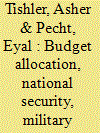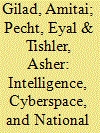|
|
|
Sort Order |
|
|
|
Items / Page
|
|
|
|
|
|
|
| Srl | Item |
| 1 |
ID:
153068


|
|
|
|
|
| Summary/Abstract |
This study develops a dynamic model that integrates military intelligence into the defense capability of the country and the optimal allocation of its government budget. We assert that the effectiveness of the country’s military intelligence is contingent on the quality of its human capital, which, in turn, implies a long-term positive relationship between the government’s various civilian expenditures and its capacity to achieve a cost-effective intelligence and, hence, military capability. This relationship is developed within a multiple-period arms race model between two rivals. Using this model and stylized data for the Israeli–Syrian arms race, we show that an appropriate budget shift from defense to civilian expenditures during the initial periods of the planning horizon will gradually (over a decade, say) increase the quality of human capital in the country and, thus, the effectiveness of its intelligence, which, in turn, will increase the country’s future security and welfare.
|
|
|
|
|
|
|
|
|
|
|
|
|
|
|
|
| 2 |
ID:
177824


|
|
|
|
|
| Summary/Abstract |
This study evaluates military intelligence as the process of data collection and knowledge development and assessment for decision-making by the military and other governmental agencies. We argue that dominance in modern warfare is enabled by human and technological intelligence that uncovers the rivals’ capabilities and intentions, increases the effectiveness of the country’s own weapon systems, and facilitates the development of high-quality defense systems. Hence, gathering and evaluating intelligence is essential for countries involved in conflict or exposed to terror threats. We focus here on the strategic and tactical implications of intelligence in the context of an arms and intelligence race between two rivals. We present and assess models that show how security agencies in countries in a state of conflict (with other countries and/or non-country entities) should invest in developing their own intelligence capabilities to ensure adequate military (security) capabilities, national security, and welfare. Since advanced cyber attackers can infiltrate almost all complex computer networks to gather intelligence (and/or cause other harms), we show how countries can establish procedures and determine the budgets to optimally allocate cyber-defense resources to prevent harmful cyber-attacks on the complex computer networks that manage their infrastructure, business, security, and government operations.
|
|
|
|
|
|
|
|
|
|
|
|
|
|
|
|
|
|
|
|
|